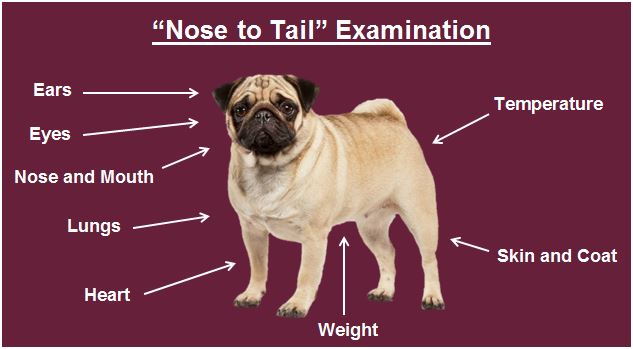Best Practices for Preventative Pet Health
When it comes to your pet’s health, it is best to take a proactive approach to management. There are powerful but simple steps pet owners can take to keep their beloved companion healthy and happy. By visiting your veterinarian (vet) regularly, keeping a routine vaccination schedule and maintaining your dog or cat’s health at home, you can help create a strong foundation for your pet to grow. Read on for preventative tips to keep your pet’s tail wagging, fur shining or purr rumbling.

Check in with your vet regularly
An annual check-up is an excellent, cost-effective way to protect your pet’s health. Your pet—and your wallet—will thank you, since regular check-ups allow a veterinarian to catch any potential health problems in the early stages, potentially resolving them more easily and less expensively.
What happens during a check-up? During most annual visits, your vet will perform a “nose to tail” examination, often referred to as the five Vital Assessments. He or she will note your pet’s weight and temperature and check for proper nutrition and pain levels. Your vet will also examine the cat or dog’s coat, skin, eyes, mouth and ears. The veterinarian will use a stethoscope to check the pet’s breathing—do the lungs sound clear? Is the heartbeat regular?
Even if you think your pet is healthy, an annual visit with your vet will help keep your pet in tip-top shape. Since dog and cats age more quickly than humans, each visit allows the vet to track your pet’s development and monitor for any issues that could turn into a serious condition.
Keep your pet vaccinated
During your pet’s check-up, the veterinarian will likely discuss your pet’s vaccination schedule. Vaccines are an important way to protect your furry friend against many preventable diseases that could otherwise be painful or even life-threatening, such as rabies and feline leukemia.
Depending on your geographic location, your pet’s history and your veterinarian’s recommendation, the proper vaccines to protect your dog or cat will vary. In general, common vaccinations for dogs include parvovirus, hepatitis, distemper and canine cough. Most cats are vaccinated for calicivirus, herpesvirus and panleukopenia. For a full list of recommended vaccinations for your cat or dog, visit www.mypet.com.
It is important to note that many vaccines initially require a short series of vaccinations that are scheduled over time. Consider making a follow-up appointment for the next shot in the series before you leave your vet’s office so you don’t miss the next dose!
Maintain good health at home
Healthy Pet Checklist
My pet has…
- Annual vaccinations
- Flea and tick control
- Heartworm prevention
- Proper diet
- Regular exercise
- Microchip
There are several things you can do year-round to create a healthy foundation for your pet. First, consider your pet’s diet. Like people, pets grow and change over time and their nutritional needs will change too. A healthy diet for a puppy or kitten is probably not going to be the best choice for an older dog or cat with a graying muzzle.
Second, in addition to vaccinations which are vital for preventing many pet illnesses, it is also important to protect your pet against common parasites, such as fleas, ticks, heartworm and intestinal worms. Talk to your veterinarian to determine the best prevention options for your pet. You can find more information about fleas, ticks and heartworm prevention by visiting www.mypet.com.
Finally, microchipping is an increasingly popular safety choice for dogs and cat owners. A microchip allows lost pets to be identified, even without a collar. A pet microchip is small—about the size of a grain of rice—and inserted beneath your pet’s skin on their back. It’s a very simple, routine procedure that takes only a few seconds and doesn’t require any anesthesia. One in three pets can go missing in their lifetime, so microchipping your pet can mean a speedier return home, safely back with you.
Taking preventative steps now can potentially save your pet from health issues later. Your dog or cat will thank you. Set up your annual visit with your veterinarian today!
